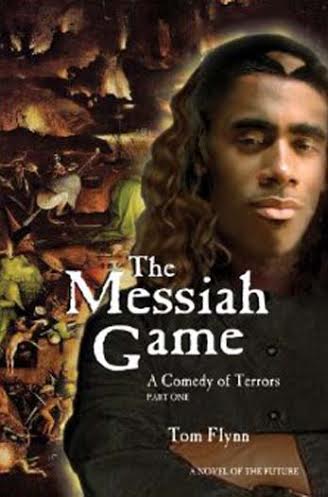By Lewis Campbell
 Book Review: The Messiah Game: A Comedy of Terrors, Part I by Tom Flynn. See Sharp Press.
Book Review: The Messiah Game: A Comedy of Terrors, Part I by Tom Flynn. See Sharp Press.
In a far distant future, humans have colonized 42,000 planets in the Milky Way galaxy through a process that is no longer remembered. Only 2,000 of these planets have technologically advanced civilizations. On the other 40,000, people live in essentially neolithic conditions. These planets are designated as Enclave planets and are protected by law from the introduction of outside technology. They constitute a sort of wilderness area for the galaxy.
.The 2,000 technologically advanced planets form the Galactic Confetory. Roman Catholicism has become the predominant religion throughout the Confetory, and the Church has established an entire planet for administrative functions, known as Planet Vatican.
The premise of The Messiah Game is intriguing, but its execution is disappointing. There are no less than five plots, none of which has any obvious connection to the others. Each chapter takes up a different plot, and following all five becomes a formidable challenge. Four of the plots are loosely joined at the very end, but this half-hearted resolution is hardly satisfying.
Even within each plot, there is very little story development. The bulk of the book is taken up with detailed descriptions of sex and violence which do little to help us understand the characters or move the story along. The main characters do engage in a good deal of dialog, but this largely consists of yelled obscenities, which doesn’t add to our understanding of the characters much either.
The Messiah Game is written in an idiosyncratic style characterized by short sentences, few verbs, and bizarre adjectives. A paragraph from the first page is typical:
She squinted into a jaundiced sunrise. The implants tugged gently in her checks. To the north, pink aurora still swirled in the sky. She turned south, upstream. Toward the body.
These short sentences, everywhere. They are so disconnected, choleric. Many of them make no sense until later. They get very tiresome. Especially after several hundred pages.
The book also uses many typographical tricks which fail miserably in their effect. One used several times is “PainpainpainPAINPAIN!” Another appears in this ultraviolet passage:
Stifling adjacency congealed. Became bottomless horror. Hideous compacting bondage. “Not like th i i i i i i i i i i i i i i s!”
You can’t help but be impressed by this kind of writing.
Along with the abundance of sex and violence, there is a strong thread of misogyny running through the book. Women are almost invariably described in terms of their sexual attractiveness, but only one man is described in this way. All the main woman characters are markedly violent, and most of them are indifferent to others. Two of them take on casual sex partners and then kill them. Well, it is supposed to be a dystopian novel.
As the name of the book might lead one to expect, there are theological discussions strewn here and there. These discussions tend to be long and pointless. Just part of one should give you the idea:
“Historically, there are two options for an intellectual in troubled times: you grab hold of some crazy impossible vision. . . . Or you maintain your perspective and start to despair.”
“You believe in the gods?” she asked.
He shook his head sourly. “I believe in what I can see.”
“I used to believe,” she said softly. . . . “In something, anyway. But it’s hard to believe in gods who would allow the Great Dismay. So much pain, so many years—could kindly forces look down on all this and do nothing?”
Since Tom Flynn is the longtime editor of Free Inquiry, it seems likely that The Messiah Game is intended as an atheist polemic. At best, though, it’s a very feeble one. While the religious characters are vain, avaricious, and manipulative, they do not differ much in these characteristics from the other characters in the novel. The one staunchly atheist character in the book is a weak bumbler who is no match for his less introspective, more mystical, and much more violent companions.
The relationship of the Galactic Confetory to the Enclave planets could be seen as an allegory for the relationship of God to the Earth. The Enclave planets typically have a few clandestine residents from the Galactic Confetory whose job is to provide entertainment for the Confetory planets. These Galactic residents are called Spectators. They have special implants that allow their audience across the galaxy to share their experience exactly. By Galactic law, the Spectators are not allowed to introduce any outside technology, and so the inhabitants of the Enclave planets often die of disease or injuries that would be easy to remedy in the Galactic Confetory. Moreover, if an Enclave inhabitant suspects a Spectator’s true identity, the Spectator can order the execution of the inhabitant by invisible spacecraft. The analogy to a wrathful and merciless God is quite striking, but this analogy is never developed in any clear way, and so its potential is lost.
It could be argued that The Messiah Game is camp, and that its outrageously poor writing, character development, and plot are intentional. This may very well be so, but that doesn’t make it any less tedious or pointless. For satire to work, there must be some real skill in its exaggeration. In The Messiah Game, there is none.
While The Messiah Game is little more than a litany of explicit, gratuitous sex and violence, with a little explicit, gratuitous theology thrown in to make things exciting, it does have one redeeming quality. It would make a blockbuster of a movie.

